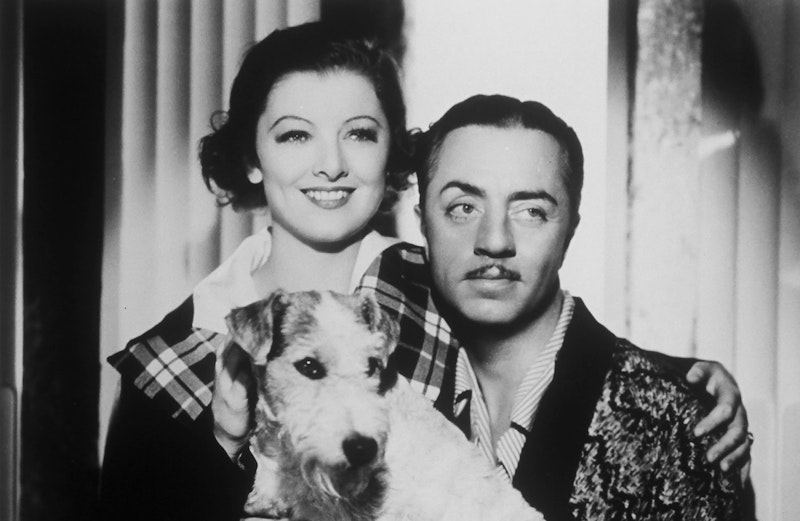William Powell and Myrna Loy have proven to be the most delightful sleuthing pair that has graced the silver screen of Hollywood. Their collaboration in the Thin Man film series (based on the books and stories by Dashiell Hammett) has transcended chronological time. Their films have become classics that we return to and watch with perpetual delight.
Yet it’s fascinating to see what the critics said about Powell and Loy’s third collaboration, Another Thin Man (1939). In The New York Times review, dated November 24, 1939, Frank Nugent praises the film but with some reservation. He’s aware that a film series oftentimes can’t sustain itself and ends up becoming repetitive, relying on old gags and tropes found in prequels. Sequels tend to demote themselves by the very fact that they’re sequels, and generally have a difficult time repeating the success of the first, or even the second film.
Nugent is kind and doesn’t trash the film, although he does offer some criticism. He writes: “Some of the bloom is off the rose. A few of the running gags are beginning to show signs of pulling up lame. All this is bound to happen when a ‘Thin Man’ leads to ‘After the Thin Man’ and develops ‘Another Thin Man.’ The law of diminishing returns tends to put any comedy on a reducing diet and it may, unless his next script is considerably brighter, confound us with a Thin Man thinned to the point of emaciation. It hasn't happened yet, mark! We're merely getting in our warning early, notifying Metro-Goldwyn-Mayer that there's a limit to everything—including the charm of the delightful Mr. and Mrs. Charles.”
Nugent isn’t necessarily wrong in his assessment. Compared to the previous films, Another Thin Man doesn’t have the same verve, but it delivers plenty of laughs. In this case, the film’s mainly a whodunit mystery rather than comedy. Nick, Nora, and Nick, Jr. (yes, they had a baby!) have been traveling (what else!) and have returned to New York. They’re invited by Colonel MacFay to spend the quiet weekend in Long Island, which turns out to be anything but quiet and relaxing.
MacFay’s murdered, and the search for the murderer is on. The police suspect Nick, despite his previous detective successes. It’s as if they’re unaware of his reputation. And so, Nick’s stuck not only in trying to solve the case but also in continuously defending himself against the attacks.
The prime suspect is Phil Church, a shady Cuban (or at least he seems so) who’s dreaming up the murders. Every time he dreams someone gets killed, they do. Nick isn’t falling for this trick, and while the police have already made a decision that Church is the murderer, Nick isn’t convinced.
Neither a respectable marriage nor a child, and certainly not Asta the dog, can stop Nick and Nora from having fun while solving crimes. Although, at times, it’s not certain who’s taking care of Nick, Jr., Nick and Nora still manage to engage in all kinds of comedic mishaps. One of the funniest scenes happens at the West Indies Club, where Afro-Cuban sounds of music fill the smoky lounges. Trying to prove to Nick that she can handle the danger, Nora pretends to be a single woman on the prowl, and engages in some unwelcoming advances from Latin lovers in the club. This kind of role playing has become a standard for Nick and Nora, and continuously adds charm to the whole story.
The line between respectability and crime is often thin. We see Nora’s family and friends who belong in the upper class, yet there’s something always amiss. Class and money doesn’t necessarily equals goodness.
On the other hand, Nick’s friends range from pickpockets to the mob, yet they all have respect for him. The two strata of society meet in the Thin Man series time and time again. In Another Thin Man, we see a particularly hilarious sequence with Wacky (an uncredited performance by Shemp Howard—one of the Three Stooges) who supposedly rents a baby for a dollar to attend Nick Jr.’s birthday party. An entire apartment is filled with mobsters with babies, and the babies aren’t that happy. “Let’s put them in the pen,” says Nora, and the mob hopes that won’t be a bad omen.
The Thin Man films have stood the test of time. We still find charm and delight precisely because William Powell and Myrna Loy breathe life into the roles, and bring ease and humor that’s timeless. In most of Hammett’s work, we’re dealing not only with a mystery but also a comedy of manners, and this is what mostly drives the films. It’s a slice of society from which we’re fully divorced from, yet Powell and Loy’s charm exude perennial humanity—something all of us can still relate to and find charming.

